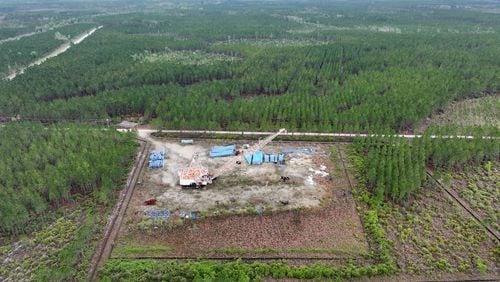In the midst of a contentious battle over a strip mine planned near the Okefenokee Swamp, the Georgia House of Representatives revived an effort Thursday to pause new permitting for similar projects.
The House Rules committee approved a substitute bill that would prevent the Georgia Environmental Protection Division (EPD) from considering new permits for “dragline” mining for three years.
Dragline mining is the same technique Alabama-based Twin Pines Minerals has planned to use to extract titanium sands from a 582-acre mine atop Trail Ridge, the line of ancient dunes along the eastern edge of the Okefenokee Swamp. Last month, EPD released draft permits permits for the project.
The company’s plans to dig within three miles of the Okefenokee National Wildlife Refuge — the largest blackwater swamp in North America — have drawn intense pushback from environmentalists, who fear it will harm the ecosystem. Twin Pines has said the mine will not harm the swamp, and EPD’s experts have mostly agreed.
The bill that advanced Thursday would not stop Twin Pines’ mine, but any expansion using the same techniques could not be considered by EPD until mid-2027.
Rep. James Burchett (R-Waycross) introduced the bill and called it a “compromise.”
The moratorium the bill would create is similar to one proposed in another piece of legislation, HB 1338, which passed the House Natural Resources and Environment committee earlier this session. But HB 1338 also placed limits on the length of time judges would have to decide challenges to permit decisions by EPD. Those judicial review restrictions were opposed by environmentalists.
“The Speaker believes this is a strong compromise that protects our environment as well as private property rights, and we look forward to it passing the House,” a spokesman for House Speaker Jon Burns said in a statement.
Critics of Twin Pines said they were still reviewing language in Burchett’s substitute.
With only days left in the legislative session, it now heads the full House. If it passes, it would then go to the Senate.
But there are only a few working days left before the end of the session March 28.
Another measure favored by environmentalists, meanwhile, appears stalled for the third straight session, despite receiving bipartisan support. HB 71, which is backed by more than 90 House members — greater than half of the chamber — remains stuck in the House Natural Resources and Environment Committee.
HB 71 received a committee hearing during the 2023 session, but has not gotten a vote or any further debate this year.
About the Author








